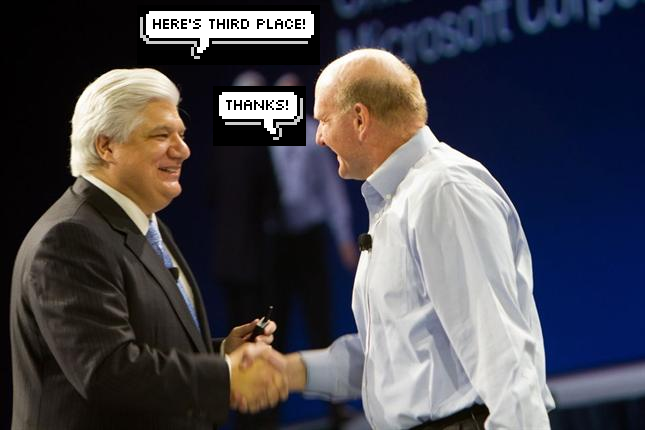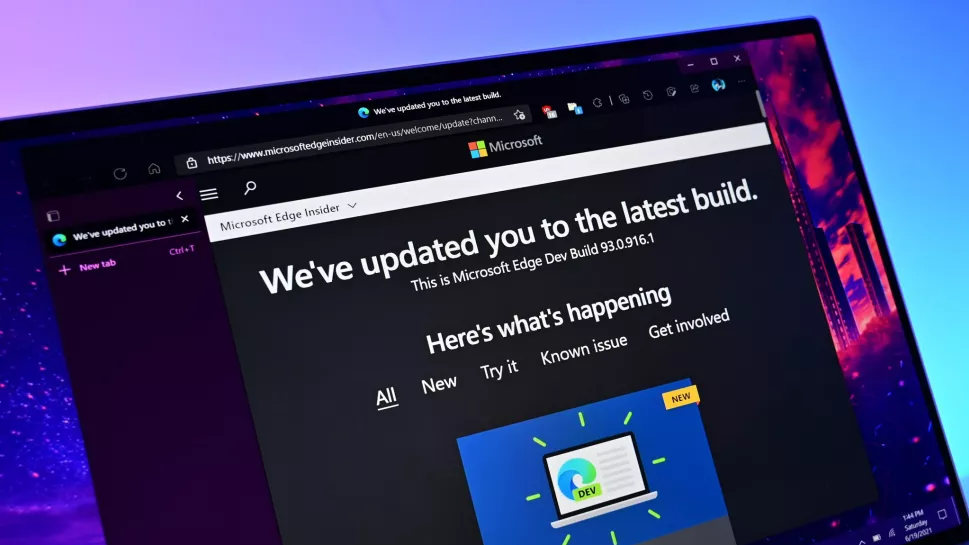RIM's woes gives Windows Phone the chance for third

All the latest news, reviews, and guides for Windows and Xbox diehards.
You are now subscribed
Your newsletter sign-up was successful
Funny how different things can be in two yearsr on the mobile front.
Early last year, Palm was still Palm, teetering under competition, but then got a life-saver by being purchased by HP. Of course that turned out to be a disaster and now Palm, webOS and that company's legacy seems to be sentenced to irrelevance. Symbian was still controlling large swaths of the market as was RIM, makers of the enterprise-friendly BlackBerry. In fact, just two years ago, RIM was sitting in first place with a whopping 42% of the device market. Now in late 2011 in the US? Just 9% according to the latest numbers from Canalys.
Things are so bad for RIM right now that its stocks, valued at US $18.91 a share, just dropped below their book value of $18.92. Book value roughly translates to "cash, inventories, real estate and intellectual property minus its liabilities" (according to the Sydney Morning Herald). Yup, the stock is worth less than what the actual company is valued at. And even that valuation, especially in patents, may be over-stated according to some, due to their age. RIM does supposedly have a trick up its sleeve: BBX, its new mobile platform. But all signs point to it not only being delayed but underwhelming as well, much like the PlayBook.
Microsoft was and some would say still is, in a precarious situation analogous to RIM. But Microsoft launched Windows Phone 7 just over a year ago and by all accounts, it's a critical success (that has yet to materialize into solid market share). But it also has a successful ecosystem with Windows, Office, Exchange, Xbox, Kinect and its myriad of cloud-services. In other words, Microsoft can literally afford to lose money until the world wakes up and their mobile OS takes off. RIM? Not so much as they have no other source of income.
So in that sense, it's no surprise to hear calls for RIM to be chopped up and sold off, like a foreclosed home to the highest bidder (see CNet) There is no faith that RIM can pull itself out of this hole, catch up and over pass Microsoft, who now have spiritually become the third major mobile OS. The tone has shifted in the last few months, can you hear it? It's due mostly due to the successful launch of Windows Phone 7.5 aka "Mango"--people now mention Windows Phone in the same breath as Android and the iPhone. BlackBerry or webOS? Not at all. A year ago, we had to wave our hands to get attention from the big developers, but no longer. Remember the blitz this summer? And with Nokia and Skype on board, things are only looking better.
Sure, two years from now we could see another massive restructuring of the players involved. But we're betting Apple, Google and Microsoft will be the only three names mentioned in mobile, with RIM retired along with webOS and Symbian. From RIM's failure to successfully compete comes Microsoft's entry as the third-way. What's more, Microsoft is poised to go even further in the next few years as its "three screens and a cloud" vision becomes a reality. Here's looking at you, 2015. We can't wait.
All the latest news, reviews, and guides for Windows and Xbox diehards.

Daniel Rubino is the Editor-in-Chief of Windows Central. He is also the head reviewer, podcast co-host, and lead analyst. He has been covering Microsoft since 2007, when this site was called WMExperts (and later Windows Phone Central). His interests include Windows, laptops, next-gen computing, and wearable tech. He has reviewed laptops for over 10 years and is particularly fond of Qualcomm processors, new form factors, and thin-and-light PCs. Before all this tech stuff, he worked on a Ph.D. in linguistics studying brain and syntax, performed polysomnographs in NYC, and was a motion-picture operator for 17 years.
